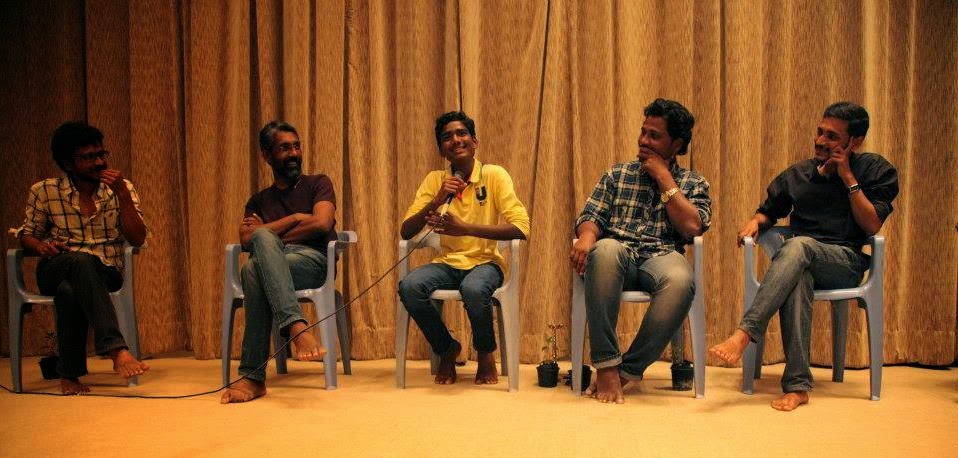In the last session of the Arbhaat Short
Film Club for this year, Umesh Kulkarni interviewed Nagraj Manjule and the rest
just followed…
Praveen Lulekar
 |
| Umesh Kulkarni and Nagraj Majule in conversation |
For a film buff, it was an occasion close to
something historic. Though that might be a hyperbole, it was more than just
exciting to see these two locked in a conversation on stage. Both faces of
today’s Marathi cinema, but with completely different sensibilities as
film-makers. The questions were short, precise and packed with sincerity, while
the answers were elaborate, in a deliciously raw tongue and spiced with
self-mocking humour. What connected them was a common passion for cinema;
cinema that is at a time realistic and artistic – as tickling as Deool and
as haunting as Fandry.
In the 12th and last session of the
Arbhaat Short Film Club for this year, Umesh Kulkarni interviewed Nagraj
Manjule. The stage was that of the National Film Archives of India (NFAI) on
March 6. After a warm felicitation by Samar Nakhate, Manjule invited his
colleagues on stage with peculiar descriptions for each one and team Fandry then
shared their experiences. Kulkarni could establish a quick connect with Manjule
when he asked about the struggle while making his first film to the latter. He
did not forget to mention that it is a struggle, “even I have faced”, before he
put the question.
Manjule was spontaneous and detailed. “I had
completed M. A. in Marathi, and then wasted a year thinking what to do next.
Since I could think of nothing, I started with M. Phil. – something to do, when
there’s nothing to do,” he quoted as the audience burst into laughter. There
were several failed attempts to clear NET/SET before his friend Mithun
Chaudhary (Assistant Director of Fandry) took him to Ahmednagar for a
course in Mass communication. “Mithun took all the lost, left out people
there,” commented Manjule, again tickling the audience.
The details
seemed funny now, but a hurt in Manjule’s tone told that it might have been
mighty difficult then. “Days in Nagar (Ahmednagar) were difficult,” a wry note
slipped among the laughter he generated. Manjule fondly remembered that
Chaudhary taught him many technicalities of script writing. “I used to write
scripts like a story,” he mentioned with a smile.
Pistulya, his
National Award winning short film, generated confidence in him. “It was Umesh
Sir who told me, at this very venue, to send it to the National Awards,” said
Manjule. Kulkarni was curious about the reflections of Manjule’s personal life
in Fandry. In an answer that wasn’t just about his film, Manjule
explained his learning process, which underlined the preconceptions we bear
about cinema.“Umesh Sir’s Girni and Mithun’s Compulsory
Helmet were the first short films I saw. Watching international cinema, I
understood that films can be beyond kutte, kamine and badlaa. Lot
of details in mainstream cinema started to hurt me. For instance, it never
showed me the real side of Dalit life. There was a character named Kachra in
Lagaan, who has a broken wrist. They never showed how it was broken,
what was his background. They only used it for the spin bowling twist,” he
said.
 |
| Team Fandry in Conversation with Umesh Kulkarni (extreme left) |
Coming to a more specific answer, Manjule mentioned that Fandry was a rearrangement of reality. “It is my story, my father’s story. It is the story of how we get torn in extremes in the process of living,” he said. About the process of scripting the film, he said that he had written the script in one go. About the message it gives, he spoke with a pinch of sarcasm – “I have told a story. Message is something we compulsively derive out of it.” But the funniest quote was reserved for Somnath Awghad, the Jabya of Fandry. Answering a question about why he was so reluctant to do the film initially, he said, “I was doubtful if this man is really a director.”
The conversation was interrupted as it was time up at NFAI. The audience was left unsatisfied as a consequence. Arbhaat Short Film Club showed Rajesh Jala’s documentary Children of the Pyre before the interaction and also felicitated director Pushpendra Singh, whose film Lajwanti (The Honour Keeper) has been selected for the Berlin Film Festival. The club plans to start again after a short break with documentaries.
Fandry will
receive many more honours in future. A recent one is that of Aamir Khan
praising the film. Kulkarni, made a telling comment in his sincere way about it
– “We should remember that Fandry has not become great because someone
praises it; it is beautiful and hence people are drawn towards it.”







.jpg)



0 comments:
Post a Comment